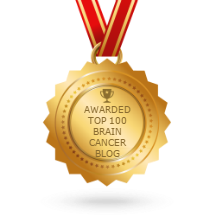On 7-8 July Deb and I attended the Brain Tumour UK Annual Conference held in association with University Hospital Birmingham. The conference which took place at the Abbey Hotel and Country Club, Redditch, was aimed at brain tumour sufferers, their families and friends. I don't intend to write in detail about the conference programme - if you want to find out more the conference presentations will be on the Brain Tumour UK website in a few weeks (http://www.braintumouruk.org.uk/index.htm). The conference included sessions on the
- identification of tumours (it is often difficult to identify the grade and type of tumour from the biopsy. In a recent study a number of neuropathologists were asked to identify tumours from a set of samples. There was only agreement in 52% of the cases. This is a difficult and complex area and the results are very subjective. However Deb's tumour, the GBM IV, is easy to identify, and not one where there is doubt.)
- current NHS treatment (the current standards are defined in the NICE guidance on Cancer Services - Improving Outcomes for People with Brain and Other CNS Tumours. See http://www.nice.org.uk/nicemedia/pdf/CSG_brain_manual.pdf. This guidance requires specialist clinics to be set up, decisions on treatment to be made by a multi-disciplinary team and the use of Specialist Clinical Oncology Nurses. Deb's treatment is fully in line with the guidance but according to others at the conference there are variations in practice across the country.)
- sessions on the latest research into brain tumour treatment, chemotherapy drugs and clinical trials currently ongoing.
It was along and tiring 2 days but well worth it. Some of the things I liked about the conference:
1 The concept of a conference which allows patients and carers to get together with professional staff in a non-medical environment and talk informally about the disease is an excellent idea. When you see your consultant at hospital they are always running late and don't have time to discuss general issues. You could do this at the conference. And because you are not talking specifically about you it is a good venue to discuss sensitive issues like palliative care and end of life planning. If other types of cancer and serious illness don't have these types of conferences - they should.
2 The speakers at the conference concentrated on the scientific method. Drugs and technologies which have been proved by peer-reviewed scientifically based research to improve outcomes. I like this. Not a foot rubbing, crystal gazing herbalist in sight. When I was at school I remember kids with braces on their legs because of the effects of polio, I was seriously ill with whooping cough, my mother nearly died from diphtheria. All diseases which have been eradicated by the application of science. Now we seem to want whatever is new - irrespective of what it costs or whether it has been through clinical trials. The attitude is: if it is available I should have it. And of course the drug companies encourage this. Its wrong. We must stick with rigorous scientific methods of evaluation for new treatments.
3 I learnt a lot from the sessions on new developments in chemotherapy for treatment of brain tumours. Research is being carried out into the molecular basis of cancer and has shown how the chromosomes in a glioma cancer cell are damaged and mutated. New treatments will target the pathways within each cell that allow the disease to take hold. In the future people with brain tumours will have their DNA analysed and will then be provided with a drug designed specifically for their tumour. The stuff of miracles.

No comments:
Post a Comment